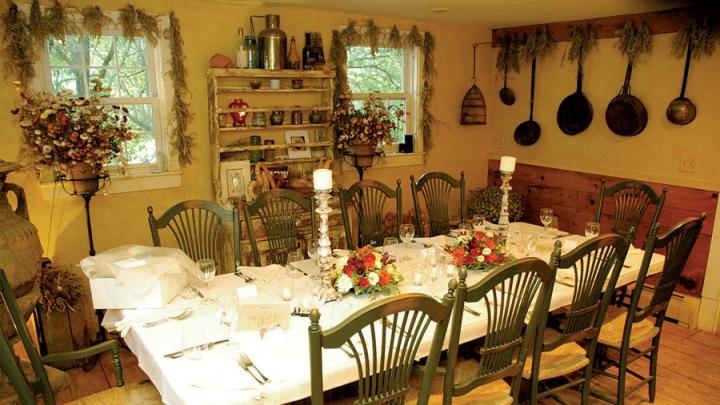Dinner guests at The Herb Lyceum at Gilson’s Farm are free to wander through the European-style gardens or the greenhouses filled with lush rosemary, thyme, and spearmint. Or they can sit out on a stone terrace with a glass of wine, breathing in the fragrant air, before settling in for a $55 prix fixe, six-course meal in the handsome, wood-beamed barn.
Open year-round on Fridays and Saturdays, this largely unheralded restaurant is set amidst a charming, five-acre working herb farm in the historic town of Groton, Massachusetts, off Route 2. Proprietor David Gilson counseled special-needs kids before switching to farming in 1989. He greets guests, emphasizing the kitchen’s “slow food” philosophy, then leaves the evening to chef Paul Callahan. A bouncy young man, Callahan seems to enjoy hanging out with diners, revealing how the food is prepared, just as much as cooking it. “I’m your personal chef for the evening,” he said one night. “Ask me anything you want.” (One woman inquired, as the evening and wine-drinking wore on, if he was married.)
In all, about 28 diners sit together European-style at two tables: you are next to strangers if you don’t come with your own large party. (Reservations are required.) There is also a BYOB policy, which can lead to sharing your wine and others’ during the three-hour meal. People become chatty, and even loud. Because it’s a self-selecting group, most of whom have traveled a good distance to dine in a beautiful spot, a jolly mood abounds, especially as each artfully prepared dish, on a menu that changes seasonally, arrives.
Callahan’s amuse-bouche was a refreshing Vietnamese spring roll with Gilson’s cilantro and edible Johnny jump-ups. This was followed by farm-raised Vermont lamb tartare, flavored with lemon and thyme. Each accompaniment—rye croutons, pickled Groton-grown ramps with a spicy Asian kick, a dollop of tomato-and-mirin sauce, and a bean purée—paired interestingly with the meat.
The rich lamb was offset by the next course, a nuanced sweet-pea soup made with a twist of spearmint and goat’s milk, “not as heavy as cream and an earthier flavor,” Callahan noted. On the side were ravioli filled with barbecued pork and chopped cranberries.
Smoked salmon, quick-cured with salt, sugar, herbs, and citrus, had a nice crustiness and tasted of lavender, thyme, and basil. The fillets came with a Provençal-style stew (barigoule) of artichokes, leeks, and fennel mixed with navy beans, celery, carrots, and a scattering of pea tendrils—earth and sea combined. Then the small slabs of regionally made artisanal cheeses arrived with a homemade biscuit, a stellar green-tomato jam, and Marcona almonds encrusted with rosemary and lavender. (The farm also sells its herbs and jams at farmers’ markets around Greater Boston.)
Dessert was a coconut and lemon verbena panna cotta served with spare elegance on a plate decorated with grapefruit slices and an innovative juniper-berry sauce; the cutting sweetness merged with the soft chunks of white cream in your mouth.
Sprigs of lemon verbena also graced each place setting and could be swirled in one’s water glass, creating a delicious scent and flavor. At Gilson’s, the focus is on the herbs, not surprisingly, and the subtle art of mixing and matching extracted flavors, just as a painter dabs to get just the right color. Or, as Callahan puts it, each course aims to be “performance art for the palate.”
Editor’s note: Groton is also the site of the Kalliroscope Gallery, a converted church, that features chamber music, readings, and exhibits, and is owned by Paul Matisse ’54 (www.harvardmagazine.com/2002/05/pure-fabrications.html).









